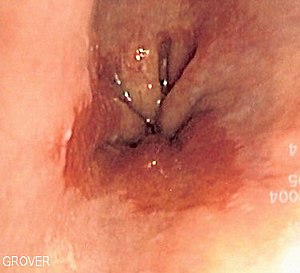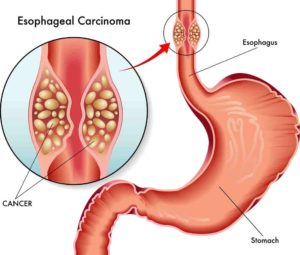
Diagnosed with Cancer? Your two greatest challenges are understanding cancer and understanding possible side effects from chemo and radiation. Knowledge is Power!
Learn about conventional, complementary, and integrative therapies.
Dealing with treatment side effects? Learn about evidence-based therapies to alleviate your symptoms.
Click the orange button to the right to learn more.
- You are here:
- Home »
- Blog »
- side effects ID and prevention »
- Endoscopic Ultrasound for Esophageal Cancer- Accurate Staging?
Endoscopic Ultrasound for Esophageal Cancer- Accurate Staging?

“As the most sensitive test for locoregional staging of EC, endoscopic ultrasound (EUS) influences the development of an optimal oncologic treatment plan for a significant minority of patients with early cancers, which appropriately balances the risks and benefits of surgery, chemotherapy and radiation.”
Dear Cancer Coach: After ultrasonic exam on my tumor today the results were T3, N0 Mx by endosonographic criteria. Scheduled for a PET scan on Tuesday? My Oncologist is suggesting Chemo/Radiation followed by surgery. My tumor is located at the junction of esophagus/stomach. Do you feel this an accurate stage? Having really hard time swallowing. I’m a white male 65 years of age. EC Al
Dear EC Al,
I am sorry to learn of your EC diagnosis. Keep in mind however, that you have been staged with early EC so your prognosis should be much better than otherwise.
To answer your question “Do you feel this an accurate stage?” While there is/are always diagnostic factors that I don’t know without seeing you, the articles linked and excerpted below speak to your situation. The first article explains why the EUS is the standard for diagnosing early EC and why your oncologist may choose to also have a PET scan.
The second article, if I read it correctly, says that EC is a difficult to treat cancer with a poor five-year survival average. My guess is that your oncologist is being thorough at the diagnosic stage (both EUC and PET) and is also treating your cancer aggressively though your EC is early stage, (chemo, radiation and surgery is aggressive and may cause short, long-term and late stage side effects) but by being so aggressive, your chances of beating the odds are better than otherwise.
The most important point is that a key factor in your diagnosis is that your cancer is local- no lymph node or distant mets involvement. My guess is that your oncologist wants to confirm this with a PET scan.
I hope this answers your question. Let me know if you have any other questions.
Hang in there,
David Emerson
- Cancer Survivor
- Cancer Coach
- Director PeopleBeatingCancer
Is endoscopic ultrasound examination necessary in the management of esophageal cancer?
“As the most sensitive test for locoregional staging of EC, endoscopic ultrasound (EUS) influences the development of an optimal oncologic treatment plan for a significant minority of patients with early cancers, which appropriately balances the risks and benefits of surgery, chemotherapy and radiation. EUS is costly, and may not be available at all centers. Thus, the yield of EUS needs to be thoughtfully considered for each patient. Localized intramucosal cancers occasionally require endoscopic resection (ER) for histologic staging or treatment; EUS evaluation may detect suspicious lymph nodes prior to exposing the patient to the risks of ER. Although positron emission tomography (PET) has been increasingly utilized in staging EC, it may be unnecessary for clinical staging of early, localized EC and carries the risk of false-positive metastasis (over staging). In EC patients with evidence of advanced disease, EUS or PET may be used to define the radiotherapy field. Multimodality staging with EUS, cross-sectional imaging and histopathologic analysis of ER, remains the standard-of-care in the evaluation of early esophageal cancers…
Esophageal cancer: staging system and guidelines for staging and treatment
“…Recommended treatment is primarily dictated by stage, tumor location, and patients’ medical fitness for receiving a particular therapeutic modality. However, definitive data from randomized trials to guide the treatment of esophageal cancer is lacking for many clinical situations. Outcomes also generally are relatively poor with many treatment strategies, so establishing optimal treatment for different clinical situations remains an area of active research (28). The NCCN guidelines reflect the lack of definitive evidence and often allow a spectrum of potential treatments for many clinical situations. Given both the generally poor overall prognosis and the potential morbidity associated with therapy, multidisciplinary evaluation by surgery, medical oncology, and radiation oncology should be considered for all patients before a treatment strategy is initiated…”


